句型分析-初高中英语衔接练习
超实用初升高英语无忧衔接:衔接点16 特殊句式 (初高考点差异及衔接)(解析版)
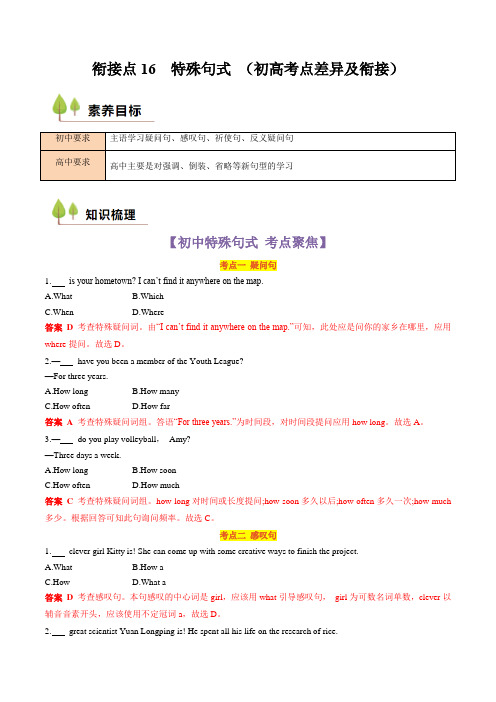
衔接点16 特殊句式(初高考点差异及衔接)初中要求主语学习疑问句、感叹句、祈使句、反义疑问句【初中特殊句式考点聚焦】考点一疑问句1. is your hometown? I can’t find it anywhere on the map.A.WhatB.WhichC.WhenD.Where答案D考查特殊疑问词。
由“I can’t find it anywhere on the map.”可知,此处应是问你的家乡在哪里,应用where提问。
故选D。
2.—have you been a member of the Youth League?—For three years.A.How longB.How manyC.How oftenD.How far答案A考查特殊疑问词组。
答语“For three years.”为时间段,对时间段提问应用how long。
故选A。
3.—do you play volleyball,Amy?—Three days a week.A.How longB.How soonC.How oftenD.How much答案C考查特殊疑问词组。
how long对时间或长度提问;how soon多久以后;how often多久一次;how much 多少。
根据回答可知此句询问频率。
故选C。
考点二感叹句1. clever girl Kitty is! She can come up with some creative ways to finish the project.A.WhatB.How aC.HowD.What a答案D考查感叹句。
本句感叹的中心词是girl,应该用what引导感叹句,girl为可数名词单数,clever以辅音音素开头,应该使用不定冠词a,故选D。
2. great scientist Yuan Longping is! He spent all his life on the research of rice.A.WhatB.What aC.HowD.How a答案B考查感叹句。
2021初高中英语语法衔接 专题8

定语从句{分类{限制性定语从句:对先行词起修饰、限制作用非限制性定语从句:对先行词起补充说明作用,与主句往往用逗号隔开,相当于并列句、状语从句等用法{ 限制性定语从句{ 关系代词{ 先行词指“物”{ (★★★)①代入定语从句后在定语从句中作主语,用that/which (★★★)②代入定语从句后在定语从句中作宾语,用that/which 。
但先行词作介词的宾语且介词已被提前时,只用which ③代入定语从句后在定语从句中作定语,用whose/of which ④用that 不用which 的情况先行词指“人”{ ①代入定语从句后在定语从句中作主语,用who/that ②代入定语从句后在定语从句中作宾语,用whom/that/who 。
但先行词作介词的宾语且介词已被提前时,只用whom ③代入定语从句后在定语从句中作定语,用whose/of whom 先行词指“人”或“物”,被the same, such 修饰,将先行词代入定语从句后先行词在定语从句中作主语、宾语,用as 关系副词{ 先行词为表示时间的名词,代入定语从句后在定语从句中作时间状语,用when,相当于“表时间的介词+which”先行词为表示地点的名词(有时地点会被“模糊化”),代入定语从句后在定语从句中作地点状语,用where,相当于“表地点的介词+which”先行词为the reason,代入定语从句后在定语从句中作原因状语,用why,相当于“for which”一. 定义定语从句:在句子中起定语作用,修饰句中的名词或代词的从句。
先行词:被修饰的名词或代词。
结构:名词/代词(先行词)+关系代词/副词+定语从句二. 关系代词引导的定语从句who/that :Is he the man who/that wants to see you?(在从句中作主语和宾语)先行词为是人的名词或代词 whom :He is the man whom/who/ that I saw yesterday.(在从句中作宾语)whose:They rushed over to help the man whose car had broken down.(在从句中作定语)which/that: A prosperity which / that had never been seen before appears先行词是事物的名词或代词(在从句中作主语和宾语)in the countryside.The package (which / that)you are carrying is about to fall down.whose: Please pass me the book whose (of which the)cover is green.(在从句中作定语)考点一考查关系代词引导的定语从句1. A person ________ e-mail account is full won’t be able to send or receive any e-mails. (天津卷)A. whoB. whomC. whoseD. whoever2. Many children, ________ parents are away working in big cities, are taken good care of in the village. (安徽卷)A. theirB. whoseC. of themD. with whom3. My friend showed me round the town, ________ was very kind of him. (全国Ⅱ)A. whichB. thatC. whereD. it4. Whenever I met her, ________ was fairly often, she greeted me with a sweet smile. (山东卷)A. whoB. whichC. whenD. that三.关系副词引导的定语从句when: There are occasions when (on which)one must yield.(介词+ which)先行词是时间、地点或理由的名词where: Beijing is the place where(in which)I was born.(关系副词在从句中作状语)why: Is this the reason why (for which)he refused our offer?四.判断关系代词与关系副词1.用关系代词,还是关系副词完全取决于从句中的谓语动词。
初高中英语衔接五大基本句型篇
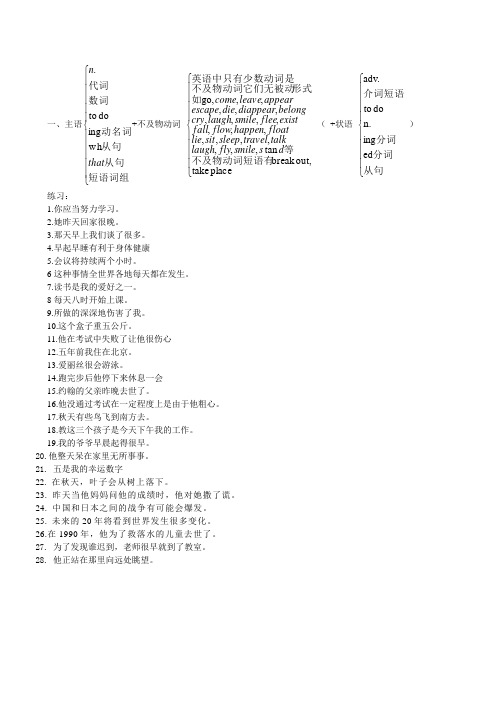
一、主语⎪⎪⎪⎪⎪⎩⎪⎪⎪⎪⎪⎨⎧短语词组从句从句动名词数词代词that n wh ing do to .+不及物动词 ⎪⎪⎪⎪⎩⎪⎪⎪⎪⎨⎧place take out,break tan ,,,,,,,,,,,,,,,,,,,,go 不及物动词短语有等如形式不及物动词它们无被动英语中只有少数动词是d s sm ile fly laugh talktravel sleep sit lie float happen flow fall exist flee sm ile laugh cry belong diappear die escape appear leave com e ( +状语 ⎪⎪⎪⎪⎩⎪⎪⎪⎪⎨⎧从句分词分词介词短语ed ing n.do to .adv ) 练习:1.你应当努力学习。
2.她昨天回家很晚。
3.那天早上我们谈了很多。
4.早起早睡有利于身体健康5.会议将持续两个小时。
6这种事情全世界各地每天都在发生。
7.读书是我的爱好之一。
8每天八时开始上课。
9.所做的深深地伤害了我。
10.这个盒子重五公斤。
11.他在考试中失败了让他很伤心12.五年前我住在北京。
13.爱丽丝很会游泳。
14.跑完步后他停下来休息一会15.约翰的父亲昨晚去世了。
16.他没通过考试在一定程度上是由于他粗心。
17.秋天有些鸟飞到南方去。
18.教这三个孩子是今天下午我的工作。
19.我的爷爷早晨起得很早。
20.他整天呆在家里无所事事。
21. 五是我的幸运数字22. 在秋天,叶子会从树上落下。
23. 昨天当他妈妈问他的成绩时,他对她撒了谎。
24. 中国和日本之间的战争有可能会爆发。
25. 未来的20年将看到世界发生很多变化。
26.在1990年,他为了救落水的儿童去世了。
27. 为了发现谁迟到,老师很早就到了教室。
28. 他正站在那里向远处眺望。
二、主语(+定语⎪⎪⎪⎩⎪⎪⎪⎨⎧ed -V ing -v do to ..从句形容词短语介词短语adj adv )+系动词⎪⎪⎪⎪⎩⎪⎪⎪⎪⎨⎧out,pro ,,a ,,re ,, ,,,,,be ,,,,look turn ve seem look ppear stay keep main get come fall go grow turn get come feel sound taset smell 结果类:表像类:保持类:变化类:感官类:+表语⎪⎪⎪⎪⎪⎪⎪⎪⎪⎩⎪⎪⎪⎪⎪⎪⎪⎪⎪⎨⎧++++从句从句介词短语从句从句介词短语动名词分词分词代词what adj..doto adj ),,,,,,(.adj -wh that do t ed ..adj .that adj to with for offrom at with in o ing adv n 1.我的兄弟都是大学生。
2024【专题训练】初高中英语衔接专题

【专题训练】初高中英语衔接专题初高中衔接练习I. Multiple choicesPart 1 11. Tom and Linda are from Australia. A. students B. girls C. boysD. sisters12. There is a lot of traffic in this city, look both ways before crossing the street.A. soB. andC. butD. for13. The world is becoming smaller and smaller because the Internet brings us.______A. the closeB. closerC. the closerD. close14. –Hello! I haven’t seen you for years. --Oh, John ?A. How are youB. How do you doC. How about youD. What are you15. Please pay your attention to your spelling. You’ve dropped “d”in the word Wednesday.A. anB. theC. aD. /16. –B y the way, do you know the National Spelling Bee? --No, I’ve never heard of it. Tell me , please.A. what is itB. what it isC. it is whatD. is it what17. Believe it or not, more than half of your body weight water.A. comes acrossB. comes fromC. comes byD. comes to18. the help of the Internet, we can learn what other people around the world are doing.A. ByB. ThroughC. WithD. For19. We won’t go sightseeing if tomorrow.A. it rainsB. it will rainC. it would rainD. it rained20. Tom a lot of friends since he came to China last year.A. madeB. makesC. is makingD. has made21. –H ow many students are there in your newly-built school? --Two thousand in classrooms.A. fourB. fourthC. fortyD. the fortieth22. Alice has been in China for several years. She be a big girl now.A. needB. mustC. canD. may23. I think high school students should not pocket money.A. be givingB. have givenD. be given24. Miss Green is the only person can help you with your English.A. sheB. whomC. whichD. who25. –Lucy, let me help you fix your computer. -- . I can manage it myself.A. That’s OKB. No, thanksC. Perhaps notD. Not at allPart 2 11. -- is that man over there? --That’s my brother.B. WhatC. WhereD. How12. –D o you enjoy your stay in Hangzhou? --Yes. I’ve had wonderful time.A. /B. aC. theD. an13. Shark is getting old and cannot jump as as he did.A. highB. higherC. highestD. much higher14. –Will you watch the World Cup match this year?--No, but I several World Cup matches since I was a small child.A. had seenB. seeC. was seeingD. have seen15. English in Canada, Australia and New Zealand as well as America and Britain.A. speaksB. is speakingC. is spokenD. spoke16. –Where is mom now? --I’m not sure. She be in the kitchen.A. shallB. mayC. needD. must17. Ted’s mother kept telling Ted not to tell lies, but didn’t help.A. whichB. itC. sheD. he18. I usually goto school bike, but sometimes I go to school foot.A. with; onB. on; byC. on; withD. by; on19. There are about two students in the newly built school.A. thousandB. thousandsC. thousand ofD. thousands of20. –Why didn’t Alice come to the party last night? --I do n’t know .A. why didn’t sheB. why she didn’tC. why did sheD. why she did21. Please the lights when you leave the classroom.A. turn inB. turn upC. turn offD. turn out22. Beth has a beautiful . Listen! She is singing very well.A. voiceB. lookC. soundD. smell23. There are some dangerous fishes in this river, and I’ve warned Jack here.A. not to swimB. to not swimC. swim not toD. to swim not24. She worked so quietly no one knew she was there.A. whichB. afterC. asD. that25. –What a nic e day! Let’s go for a picnic on the beach together. -- .A. GoodbyeB. Good ideaC. Good jobD. Good day Part 31.All pilots must the passengers safety.A. be responsible forB. be responsible toC. respond forD. respond to2.“ Is there here?” Mary entered the room and shouted.A. anybodyB. somebodyC. somethingD. anything3. Chinese, we study English , maths, physics in school.A. ExceptB. BesidesC. BesideD. Without4.If it is true, it interesting questions.A. raisedB. roseC. raisesD. rises5.The two found their luggage in the end.A. GermanB. GermenC. GermansD. Germany6.Is a human brain a more powerful than a computer?A. calculateB. calculationC. calculatingD. calculator7.His father as well as us his work.A. are pleased withB. is pleased withC. are pleased ofD. is pleased for8.– Which of the two English dictionaries will you buy?– I will buy of them , so I can give one to my friend, Helen.A. eitherB. neitherC. bothD. all9.The students of Class Three have already finished the lessons.A. twenty –fifthB. twenty-ninethC. 23thD. twentieth-six10.Everybody in Troy went to sleep the guards.A. includeB. includesC. includingD. included11.Because of his poor health, his dream of becoming a basketball player could not be realized.A. come trueB. be recognizedC. be rememberedD. be recalled12.The boy the spelling mistake.A. aware ofB. was unaware ofC. is unawareD. unaware of13.Everybody should the environment pollution.A. prevent…fromB. protect…fromC. stop…fromD. keep…from14.The kind old lady the poor dog as I he were her son.A. looked afterB. looked forward toC. looked forD. looked through15.Chris is a . The police think he killed the old man and are trying to catch him.A. suspectB. criminalC. detectiveD. guilty16.The famous detective told me about a(n) h e dealt with last moth.A. storyB. actionC. adventureD. case17. The antique shop sometimes sells fakes. They customers from time to times.A. sellB. cheatC. attackD. purchase18.If you a crime,you must expect to be punished by law.A. watchB. commitC. makeD. find19.A young man in black M rs White’s bracelet last week.A. robbed ofB. robbedC. stoleD. stole of20.Doris for six years.A. was in prisonB. put into jailC. was sent into prisonD. went into jailII. 完形填空When I was three years old just before my sister was born, my mom asked me what we should name the new baby. I sai d, “Let’s call 26 Gravy(肉汁)!”You know, we pour gravy over meat and it tastes good! My parents found my 27 interesting, but named the new baby Caroline, instead.Having a sister 28 my life. When my sister and I played together, we 29 got into fights and got angry with each other if we did 30 wrong. It sometimes drove our parents crazy.31 at the sametime, we learned to share our things and to forgive(原谅) each other when we got32 .In North America, there are many kinds of families, but 33 families have a boy and a girl. Of course, some have three or more. In China, most children 34 have brothers or sisters, and they have to learn those things in other ways, which is more 35 .When I 36 away to university, my sister 37 me she wished I still lived at 38 . She wasn’t used to getting all the atte ntion from my parents. But Chinese children get all the attention for all their life!Some middle school 39 in China wish they had a brother or sister. If you are one of them, I 40 a good idea for you. Treat your friends and classmates as your brothers and sisters!26. A. her B. him C. me D. them27. A. news B. idea C. lesson D. story28. A. began B. saw C. changed D. enjoyed29. A. never B. again C. seldom D. often30. A. something B. everything C. anything D. nothing31. A. But B. So C. Or D. Through32. A. angry B. excited C. hungry D. worried33. A. few B. several C. all D. most34. A. shouldn’t B. don’t C.needn’t D. wouldn’t35. A. beautiful B. difficult C. careful D. friendly36. A. took B. put C. moved D. came37. A. asked B. answered C. told D. warned38. A. home B. work C. school D. family39. A. students B. teachers C. workers D. lovers40. A. give B. have f C. learn D. makeIII. 阅读理解A) I have never taken cooking classes. I learned cooking from my mother because she was really interested in teaching me how to cook. The main reason forthis was because when my mother got married, she didn’t know how to cook anything, not even an egg. My grandmother never allowed her to stay in the kitchen when she was cooking.My mother did not start to cook until she was 25 years old. In the beginning, it was very hard for her. Therefore, she had to take cooking classes to prepare our meals. After having that experience, she decided to teach me how to cook because she didn’t want me to have the same experience.I remember when I was seven years old, and my other was cooking, I was with her in the kitchen enjoying cooking. I always helped her. Sometimes we prepared meals that my mother already knew how to make, and sometimes we prepared them from recipes. Nowadays, I am really thankful for that experience because I don’t need help to cook a meal. I can cook for me alone or for a group of people; it doesn’t matter.I will do the same with my c hildren because I don’t want them to have the same experience as my mother. If one day I am not with them, I want to be sure that they can carry on their lives without me.41. The writer’s mother learned cooking .A. from the writer’s grandmotherB. all by herselfC. by taking cooking classD. from cooking books42. The writer’s mother taught the writer how to cook because .A. she wanted the writer to be more independent(独立)B. the writer was interested in cookingC. she thought it a must for a woman to learnD. she needed more help when she was cooking43. The underlined work “recipes”in this passage most probably means.______A. instructions on how to prepare foodB. experiences of cooking foodC. some well-known cooksD. tools for cooking and heating food44. We can learn from the passage that the writer’s children will .A. hate cookingB. learn cookingC. teach cookingD. forget cooking45. The writer must think cooking is to learn in life.A. interestingB. difficultC. enjoyableD. importantB) Banbury House Tel: 564839Enjoying mixing with other students in pleasant accommodation (住宿) 30 minutes from the station and close to all main bus routes. Single and double rooms. Students provide own food but all cleaning services offered. Please bring your own bed things.Three Seasons Tel: 445987We can provide all types of accommodation for all types of single student. Rooms are fully prepared with bed things and have reasonable prices. Full board possible. 35—40 minutes from main universities and the city.Sturtin Hostel Tel: 876333We offer beautiful views. It lies in pleasant countryside. Relax after a long day by swimming in the pool or using the exercise gym. Separate study rooms available. No children. Bar & restaurant.First Shop Tel: 223300Ideal for new students, we provide double rooms. If you wish, we can offer help in finding a suitable person to share a room with. All washing and cleaning services offered at extra charge.Large canteen and three bathrooms on each floor.46. Which number would you ring if you are interested in sports?A. 564829B. 445987C. 876333D. 22330047. offers help in finding a room-mate.A. Banbury HouseB. Three SeasonsC. Sturtin HostelD. First Shop48. If you live in Banbury House, you have to .A. do cooking by yourselfB. do cleaning by yourselfC. travel by trainD. take a school bus49. The articles above are mainly for .A. family accommodationB. student accommodationC. travel accommodationD. cheap accommodation50. The four texts above are most probably .A. lettersB. noticesC. invitationsD. advertisementsC) Many years ago when people had no thermometers(温度计), they usually touched a thing to see how hot or cold it was. The following experiment shows easy it was to make a mistake.Take three glasses: the first one with very hot water, the second one with very cold water, and the third one with water at room temperature. Then you put a finger of one hand in the hot water, and a finger of the other hand in the cold water. You hold your fingers in the two glasses for a That is minute. Then you use each finger, one after another, one after another, to see how hot or cold the water in the third glass is. You will find that the water is warm to the finger that was in the coldwater before, but the finger which was in the hot water will feel cold in the same glass of water.That is why you must always find the temperature in a scientific way. You must not try to tell the temperature as it seems to you.You will often make a mistake if you take something that seems to you for a real fact. For example, when you are going to an Amusement park by bus and you want to get there very quickly, it seems to you that your bus is going very slowly, slower than the other buses. But if it is Sunday and you have much free time, it seems to you all the buses and cars are going very fast.51. The experiment tells us that sometimes it is to make a mistake.A. interestingB. difficultC. easyD. helpful52. The water in the third glass is .A. colder than the water in the first glassB. hotter than the water in the first glassC. colder than the water in the second glassD. as cold as the water in the second glass53. What will you find if you put the finger which was in the first glass into the second glassaccording to the experiment?A. The water is hotter than it is in the first glass.B. The water is as hot as it is in the first glass.C. The water is at room temperature.D. The water is colder than it is in the first glass.54. How should we find the temperature according to the passage?A. Try to tell as it seems to us.B. Try to use our fingers.C. Try to tell in a scientific way.D. Try to touch something to see how hot it is.55. We can learn something about from the passage.A. B. C.physics chemistry psychology(心理学)D. biology(生物学) IV. 词语填空用方框中所给单词的适当形式填空,使短文通顺、正确、连贯(每个单词限用一次)The United States is known for its fast food. A lot of people don’t have the time to shop and cook and clean up 56 a meal. Today, fast food is 57 cheap, which makes it even more attractive. And it is everywhere— not only in the United States 58 around the world. Now, 59 , there is a group of people who would like to see us stop 60 so much fast food. These people belong to the Slow Food Movement.The Slow Food Movement started in Italy in 1986. It was 61 by Carlo Petrini, a food critic who 62 owned a restaurant. He and his friends wanted to encourage more people to slow 63 and learn to prepare and enjoy good food again. 64 began by meeting in small 65 to organize dinners and wine tastings. They also began toencourage 66 local farmers to go back to the old ways of growing food and caring for farm animals. They felt that food that was raised carefully tasted 67 .This small Italian group grew, 68 in 1989 the International Slow Food Movement was born in Paris. Today there 69 78,000 members in 100 countries. There is also a 70 magazine, printed in six languages, including Japanese.V. 短文改错Cell phones can be see almost everywhere in 71.school now. Many teacher say that we students 72.should not use cell phones at school. But I think 73.it should be allowed to use at school because 74.we want to get touch with our parents. Cell 75.phones can be used almost anywhere or at any 76.time. What more, cell phones can be great fun, 77.too. Besides make phone calls, we can also play 78.games and sent text messages to our friends by 79.cell phone. Don’t you think of they are necessary?80.VI. 书面表达假如你刚去澳大利亚的一所高中读书,在上第一节课时,你填(打勾)了一张表格(见听力测试第二大题)。
英语句型结构与句子成分划分

英语句型结构与句子成分划分高一英语初高中衔接练习第二讲英语句型结构与句子成分划分一、句子类型(1)、简单句:只有一个主语(或并列主语)和一个谓语动词(或并列谓语动词)构成的句子。
1) 简单句的类别1.陈述句(肯定句、否定句)2.疑问句(一般、特殊、选择、反意3.祈使句4.感叹句(How + adj. ( +S + V) ! What + n. ( +S + V) !2) 简单句的基本词序主语谓语宾语状语I bought a hat yesterday.The children ran home.The taxi driver shouted at me angrily.We ate our meal in silence.The car stopped suddenly.A young girl walked confidently on the stage.(2)、并列句:由两个或两个以上等立而又相互独立的简单句构成,两个简单句由并列连词连在一起。
其结构是:简单句+并列连词+简单句1. I help him and he helps me .2. He failed many times but he wasn’t discouraged.3. We must hurry, or we shall miss the train.4. Not only did he write to us but also he came here yesterday.5. Either he didn’t speak clearly or I didn’t hear well.(3)、复合句:简单句中的某一个成分由一个句子来充当。
1.名词性从句:主语从句、宾语从句、表语从句、同位语从句1) What he said just now is right. 2) He said that he had seen the film.3) This is why he didn’t go to school.4) The news that he has passed the exam made me happy.引导名词性从句的连词有:that, which, if, whether, who, whom, whose, when ,how, where, why, ever. 2.修饰性(形容词性)从句:定语从句1) The man who is standing there is White.2) The building which was built is a school. 3) This is the place where I lived.引导定语从句的连词有:that, which, who, whom, whose, when, where, why.3. 副词性从句:状语从句(条件、时间、地点、原因、目的、结果、方式、比较、让步状语从句)引导状语从句的连词有:2when, while, as, as soon as, after, since, until, till, where, if, unless, because, in order that, so…that…, though, wherever, whenever, as …as, not so…as, than二. 句子成分划分<1>. 讨论题: 找出下列句子中相应的成分:1.Subject (主语) The sun rises in the east.2.Predicate.(谓语)We study English.3. Object(宾语)We love China.4. Predictive(表语)We are Chinese.5.Attributive/Attribute(定语)This is a difficult problem.pletement(补语) We elected him monitor.7.Adverbial(状语)He runs fast.8.Appositive(同位语)This is Miss Zou, my teacher.9.Parenthesis(插入语)To be frank, I don’t agree with you.<2> 句子成分的分类1. 主语: 主语表示句子要说明的人或事物。
初高中衔接英语语法专项练习:IV时态 Word版含答案

IV时态1. My dictionary ,I have looked for it everywhere but still i t.A.has lost; don't findB. is missing; don't findC.has lost; haven't foundD. is missing; haven't found2. We were all surprised when he made it clear that he office soon.A.leavesB. would leaveC.leftD.had left3. —We could have walked to the station; it was so near.—Yes,a taxi a t all necessary.A.wasn'tB. hadn't beenC.wouldn't beD.won't be4. If city noises f rom increasing, people shout to be heard even at the dinnertable 20 years from now.A.are not kept; will have toB.are not kept; have toC. do not keep; will have toD.do not keep; have to5. Tom i nto the house when no oneA. slipped; was lookingB.had slipped; lookedC. slipped; had lookedD. was slipping;looked6. The students b usily when Miss Brown went to get a book she in theoffice.A. had written;leftB.were writing; has leftC. had written; had leftD.were writing; had left7. We are proud of the achievements we since liberation.A.madeB.have madeC. makeD. will make8. He says he the book several times in the past few years.A.has readB.had readC.readD.reads9. The egg must be bad. It off a terrible smell.A.was givingB.gaveC.is givingD.is given10. The telephone for two minutes before it was answered.A. has rungB. has been ringingC.had been ringingD.rings11. I to Beijing only once before.A.wentB. have goneC. have beenD.was12.—When are you going to meet him?—As soon asI m y dinner.A. will finishB.finishC.am going to finishD.finishes13. By the end of last week we. t he task ahead of time.pletedB. have completedC. was completingD. had completed14. This time tomorrow I t o Shanghai.A. will flyB.would flyC.am going to flyD.will be flying15. I can't go swimming because I m y leg.A.brokeB.had brokenC.have brokenD. have beenbroken16. I'm sorry butI t hat you a diary.A. don't notice; are writingB. don't notice; have writingC. didn't notice; wroteD.didn't notice; were writing17. I didn't know you y our raincoat here when you t o see me the other day.A.had left; had comeB. had left; cameC.left; cameD. left; werecoming18. be careful when your homework.A.Do; doingB. Do:doC.To; doingD.To; do19.—Are you going to the meeting?—No, the meeting u ntil next Monday.A. will be put offB.has been put offC. will put offD. has put off20.He insisted that he i n good health.A. wasB.beC.isD. was being21. If the doctor an hour earlier,the boy would have been saved.A.cameB.could comeC. should comeD.had come22.—What do you think to her?—She must have lost the ticket.A.happenedB. had happenedC.will happenD.happens23. Don't be angry, you?A.willB.won'tC.doD.don't24. I don't know where he is. I might know now where he h ad I arrived here a littleearlier.A. wasB.isC. should beD.must be25. He wrote to me t hat he to see me in July.A. said; would comeB.said; will comeC.saying; would comeD. saying; willcome26. I'll write to you as soon as IA.arriveB. will arriveC.am going to arriveD.am arriving27. No sooner d own the doorbell rang.A.had I sat; whenB.did I sat; thanC.I had sat; beforeD.had I sat; than28. this Street and you there.A. Followed; will getB. Following; getC.Follow; will getD. Follow;ger29. If she doesn't visit the doctor.A.neither will heB.neither won't heC.nor does heD.nor doesn't he30. No one out the cause of the trouble in the machines until yesterday.A.has foundB. was findingC. had foundD.would find31. I won't believe you untilI y ou sing the song with my own eyes.A.heardB.will hearC. have heardD.had heard32. I a cold for several days. can you help me get rid of it?A.haveB.have hadC. had hadD.am having33. He .The painting will be finished soon.A.has paintedB.paintedC. was paintingD. has beenpainting34. She said that he t o Chengdu.A. has never beenB.had never beenC. will goD. would send35. Look! The boy you in the park the other day t owards us.A. met; is runningB. had workedC.meet; will runD.has met; runs36. You must be very tired; you for quite a long time.A.workedB.had workedC.has workedD.are working37.—Have they started building a house for you?—Yes,it now.A.is buildingB.has buildC.has startedD. is being buill38. May fifth is my birthday.I a small party.A.will planB.am to planC.plannedD.am planning39. Tom t hat most of the guests when he arrived at the party.A.disappointed; had leftB.had been disappointed; leftC. was disappointed; had leftD.had disappointed; left40. He must have washed the shirt. h e?A.didn'tB.haven'tC.mustn'tD.can41. I don't know when he ,but when he I shall let you know.A. comes; will comeB.will come; comeses; comesD. will come;came42. I to the seaside until I went to Hainan.A.would never goB.have never beenC. did never goD.had never been43. You'd be sorry if you a n accident on the journey.A. haveB.hadC. had hadD. would have44. Can you see the sign over there, which :"Keep off the grass"A.readsB. is readC.readingD.has read45.When I down the street the other day, I happened to notice a leather wallet lying onthe ground.A.walkingB.was walkingC. walkedD. was to walk46. At this time tomorrow Grandpa at the table with us.A.sitB.sitsC.is sittingD.will be sitting47. What happened when they. TV?A.watchedB.will watchC.are watchingD.were watching48. Look Out! t he dog.A.Out rushesB.Out rushedC. Out is rushingD. Rushed out49. I want to try on the coat you bought yesterday, whereA. was itB.is itC.has it beenD. did you put50. He is now in America.It 3 years since he Wuhan.A.is; leftB.is;has been away fromC. was; had leftD. has been; hasleft51. w hen it began to rain.A. Hardly did he arriveB.Hardly he had arrivedC. Hardly he arrivedD.Hardly had he arrived52. as if he had been ill for a long time.A.He seemedB.He lookedC.It lookedD.It seems53. He t o go into hospital if his illness gets worse.A.hadB.must haveC. will haveD.has54. The teacher said the Yellow River the second longest river in China.A.isB.wasC. will beD.has been55. Somebody my pen,for it o n my desk.A.must take; isn'tB.must have taken; isn'tC. took; had beenD.might have taken; wasn't56. Would you mind if I on the radio?A.turnB.turnedC. will turnD.should turn57. She is happy t he watch she lost.A. to foundB.to findC. to have foundD.finding58. I don't think he a ble to pick out my friends in such a big crowd.A.isB.can beC.will beD.should be59. I happened w hen Miss Li came for a visit.A. to readB.to have readC. to be readingD.that I was reading a book60. I'd rather you t omorrow.eB.cameC.will comeD. would come 1—10.DBAAA DBACC 11—20.CBDDC DCABA 21—30.DAABC ADCAC 31—40. CBDBA CDDCA 41—50.BDBAB DDABA 51—60.DBCAB ACCCB。
专题13初高中衔接阅读理解(练习)-2023年初高中衔接英语精品课件专项训练(新高一适用)

专题13 初高中衔接阅读理解一.基础巩固练1. “I think we can make a difference,”says Sparks, who points out that his love of comics inspired him.〖明句式〗“I think we can make a difference,”为says宾语,who引导的定语从句修饰主语Sparks.〖句子翻译〗____________________________________________________________________________2. It’s a symbol of honor, particularly because the lawn on the top deck of the ship has special challenges with growth at sea, including “burns” from the salt water, which must be washed off immediately and clearance checks before the ship can pull in to the shore.〖明句式〗It’s a symbol of honor是主句,because 引导原因状语,which引导定语从句修饰“burns” from the salt water。
〖句子翻译〗________________________________________________________________________________________________________________________________________________________3.Though the option of walking barefoot through a grassy field on a moving cruise ship seems terrific , there are many other ships that are trying to outdo one another with even more surprising guest options. 〖扫清词汇〗 barefoot adv. 赤着脚地 ; outdo one another 超过对方;option n.选择 ;terrific adj.极好的,极其的〖明句式〗Though 引导让步状语从句,there be...为主句〖句子翻译〗________________________________________________________________________________________________________________________________________________________4. Once identified , lands with minimal or no earthworm damage should be protected.〖明句式〗Once identified为状语从句中的省略,充当条件状语。
2021初高中英语语法衔接 专题4

动词不定式一. 动词不定式的形式二.不定式所作的成分1. 作主语eg: To go abroad is my dream. To be taken abroad is my dream.不定式短语作主语时, 往往放在谓语之后, 用it作形式主语.句型:It is/was +adj.+ of sb. to do sth. (用of 的adj: rude, cruel, clever, stupid, foolish等)for sb. (用for的adj: possible, important, necessary, hard等)It is/was + n. + (for sb.) to do sth.eg:It’s stupid of you to do such a thing.It’s impossible for me to finish the work today.It’s a rule for the students to clean the classroom every day.2.作宾语(1)只能接不定式做宾语的动词:hope, wish, expect, desire, pretend, manage, plan, intend, attempt, decide,happen, seem, learn, offer, promise, refuse, seek, would like to, would love to等eg:The book seemed to have been translated into English.I happened to have witnessed the accident.I hope to be praised by my headteacher one day.(2)当主句谓动是think, find, believe, make…用不定式做宾语时,又带宾补时, 常把不定式放在宾补后, 用it 作形式宾语:sb. think/ believe/ find/make + it + n./ adj. to do sth.eg:I find it interesting to work with him.He made it clear to go there with her the next day.注意:动词不定式在介词but, except, besides后面时, 如果这些介词之前有行为动词do的各种形式, 那么, 这些介词后的不定式不带to, 否则要带to. 例如:She could do nothing but cry.I have no choice but to go. = I don’t have any choice but to go.3. 作宾语补足语1). to do作宾补的词:advise, allow, ask, beg, cause, encourage, expect, force, get, like, order, permit, persuade, prefer, require, tell, want, warn, wish等。
初高中衔接英语—Unit 3 Could you please tell me where the restrooms are?
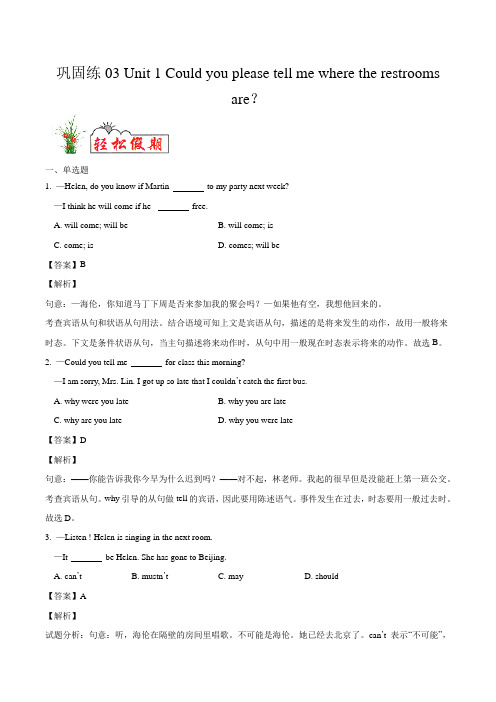
巩固练03 Unit 1 Could you please tell me where the restroomsare?一、单选题1. —Helen, do you know if Martin to my party next week?—I think he will come if he free.A. will come; will beB. will come; isC. come; isD. comes; will be【答案】B【解析】句意:—海伦,你知道马丁下周是否来参加我的聚会吗?—如果他有空,我想他回来的。
考查宾语从句和状语从句用法。
结合语境可知上文是宾语从句,描述的是将来发生的动作,故用一般将来时态。
下文是条件状语从句,当主句描述将来动作时,从句中用一般现在时态表示将来的动作。
故选B。
2. —Could you tell me for class this morning?—I am sorry, Mrs. Lin. I got up so late that I couldn’t catch the first bus.A. why were you lateB. why you are lateC. why are you lateD. why you were late【答案】D【解析】句意:——你能告诉我你今早为什么迟到吗?——对不起,林老师。
我起的很早但是没能赶上第一班公交。
考查宾语从句。
why引导的从句做tell的宾语,因此要用陈述语气。
事件发生在过去,时态要用一般过去时。
故选D。
3. —Listen ! Helen is singing in the next room.—It be Helen. She has gone to Beijing.A. can’tB. mustn’tC. mayD. should【答案】A【解析】试题分析:句意:听,海伦在隔壁的房间里唱歌。
高中英语 初升高衔接-句子结构

第二讲句子结构课前热身一、说出下列句子属于哪种类型1. Plants need water.2. The flower is so fresh.3. They work hard.4. He gives me some seeds.5. We should keep the plants in the shade.二、说出下列句子哪些是并列句1. The teacher's name is Smith.2. The teacher's name is Smith and the student's name is Jo.3. He is Smith who likes going hiking.4. He is Smith and he likes going hiking.5. Hurry up, or you'll be late.6. I saw him when I walked past the street.7. He often gets up early because he wants to catch the early bus.8. Jim finished his homework and he went to bed.句子成分五种基本句型1. Subject (主语) +Link. V(系动词) +Predicate(表语)这种句型中的系动词一般可分为下列两类:1) 表示状态的连系动词。
这些词有:be, look, seem, appear, smell, taste, sound, keep, remain, stand等等。
如:We should remain modest and prudent any time.This kind of food tastes terrible.The picture looks more beautiful at a certain distance.2) 表示转变或结果的系动词。
英语牛津译林版-初高中衔接-基本句型教案(附答案)
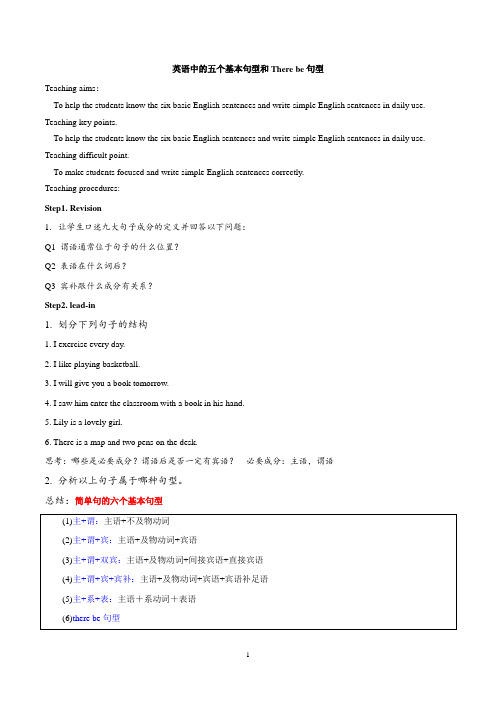
英语中的五个基本句型和There be句型Teaching aims:To help the students know the six basic English sentences and write simple English sentences in daily use. Teaching key points.To help the students know the six basic English sentences and write simple English sentences in daily use. Teaching difficult point.To make students focused and write simple English sentences correctly.Teaching procedures:Step1. Revision1.让学生口述九大句子成分的定义并回答以下问题:Q1 谓语通常位于句子的什么位置?Q2 表语在什么词后?Q3 宾补跟什么成分有关系?Step2. lead-in1.划分下列句子的结构1. I exercise every day.2. I like playing basketball.3. I will give you a book tomorrow.4. I saw him enter the classroom with a book in his hand.5. Lily is a lovely girl.6. There is a map and two pens on the desk.思考:哪些是必要成分?谓语后是否一定有宾语?必要成分:主语,谓语2.分析以上句子属于哪种句型。
总结:简单句的六个基本句型Practice1.下列句子分别属于哪种句型?1. He is in the classroom now .2. There will be a lecture in the meeting room tomorrow.3. The flight takes off at 9:00 in the evening .4. To save money , I suggested going there on foot .5.Nothing is impossible.6. There is a bed , a table and two chairs in the room .7. I sent Li Ming an email last night.8. I found the sports magazine very interesting .Step3. Self-exploration &cooperation1.用六大基本句型造句。
初升高英语衔接语法部分---句子成份,简单句,并列句,复合句
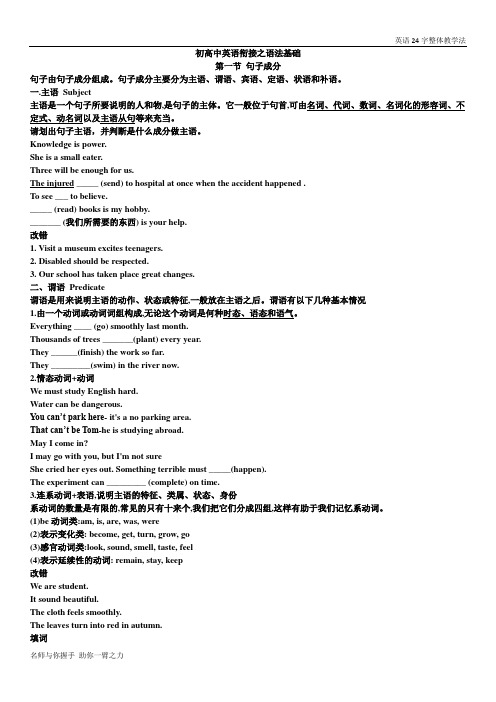
初高中英语衔接之语法基础第一节句子成分句子由句子成分组成。
句子成分主要分为主语、谓语、宾语、定语、状语和补语。
一.主语Subject主语是一个句子所要说明的人和物,是句子的主体。
它一般位于句首,可由名词、代词、数词、名词化的形容词、不定式、动名词以及主语从句等来充当。
请划出句子主语,并判断是什么成分做主语。
Knowledge is power.She is a small eater.Three will be enough for us.The injured _____ (send) to hospital at once when the accident happened .To see ___ to believe._____ (read) books is my hobby._______ (我们所需要的东西) is your help.改错1. Visit a museum excites teenagers.2. Disabled should be respected.3. Our school has taken place great changes.二、谓语Predicate谓语是用来说明主语的动作、状态或特征,一般放在主语之后。
谓语有以下几种基本情况1.由一个动词或动词词组构成,无论这个动词是何种时态、语态和语气。
Everything ____ (go) smoothly last month.Thousands of trees _______(plant) every year.They ______(finish) the work so far.They _________(swim) in the river now.2.情态动词+动词We must study English hard.Water can be dangerous.You can’t park here- it's a no parking area.That can’t be Tom-he is studying abroad.May I come in?I may go with you, but I'm not sureShe cried her eyes out. Something terrible must _____(happen).The experiment can _________ (complete) on time.3.连系动词+表语,说明主语的特征、类属、状态、身份系动词的数量是有限的,常见的只有十来个,我们把它们分成四组,这样有助于我们记忆系动词。
2021初高中英语语法衔接——感叹句
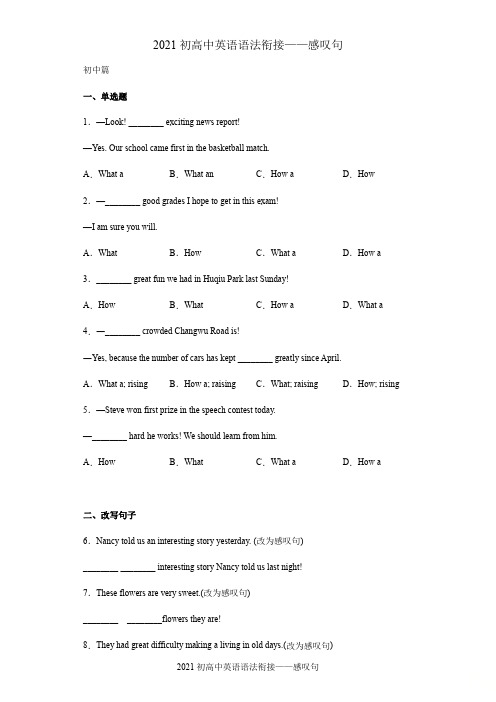
2021初高中英语语法衔接——感叹句初中篇一、单选题1.—Look! ________ exciting news report!—Yes. Our school came first in the basketball match.A.What a B.What an C.How a D.How 2.—________ good grades I hope to get in this exam!—I am sure you will.A.What B.How C.What a D.How a 3.________ great fun we had in Huqiu Park last Sunday!A.How B.What C.How a D.What a 4.―________ crowded Changwu Road is!―Yes, because the number of cars has kept ________ greatly since April.A.What a; rising B.How a; raising C.What; raising D.How; rising 5.—Steve won first prize in the speech contest today.—________ hard he works! We should learn from him.A.How B.What C.What a D.How a二、改写句子6.Nancy told us an interesting story yesterday. (改为感叹句)________ ________ interesting story Nancy told us last night!7.These flowers are very sweet.(改为感叹句)________ ________flowers they are!8.They had great difficulty making a living in old days.(改为感叹句)________ ________ ________ they had ________ a living in old days!9.The mooncakes are delicious. (改为感叹句)________ ________ the mooncakes are!10.Y uan Long ping is still working hard at developing better rice plants. (改为感叹句) ________ ________ Yuan Long ping is working at developing better rice plants!高中篇1.(2020·全国高三专题练习)________useful information you gave me! Thank you very much. A.What B.What aC.What an D.How12.(2020·全国高三专题练习)________ exciting news! We’ve never had ________ long vacation before.A.What; such a B.What an; such aC.How; such a D.What; so13.(2021·天津静海一中高一月考)You can't imagine ________great danger the firefighters were faced with when they tried to put out the big fire.A.which B.how C.whether D.what 14.(2020·全国高三专题练习)—Happy Teachers' Day! Here are some flowers for you.—________beautiful the flowers are! Thank you.A.How B.How a C.What D.What a 15.(2020·全国高三专题练习)—Look! ________ clean the classroom looks!—Yes. I’m sure somebody ________ it up.A.What; has cleaned B.How; has cleanedC.What; cleaned D.How; cleaned每日必背71He was sentenced to three years in prison for stealing.他因偷窃被判处三年监禁。
初高衔接英语句子成分及基本句型课件-高中英语初高中衔接

S
Vt
IO DO
2)Grandma cooked us a nice meal.
S
Vt
IO DO
3)She gave the baby a bath.
S Vt
IO
DO
4)The boy asked me if I could speak Chinese.
S
Vt
IO
DO
5.主+谓+宾+宾补 (S+ Vt+ O+ OC)
1. I like English.
n.
2. I don't like it.
pron.
3. I enjoy working.
v-ing
4. Give me four please. num.
5. We need know what others are doing. 句子
(五)定语(attribute):修饰名词或代词, 单词作定语通常放在所修饰的名词之前,前置定语 短语或从句做定语时则放在名词之后。后置定语
7. I have nothing to eat.
to do非谓作后置定语
(六)状语(adverbial ):修饰动词、形容词、副词以及全句,表示 动作发生的地点、时间、原因、目的、结果、条件、让步、伴随情 况等。
常见作状语:副词、介词短语、非谓语(doing、done、 to do)、
when/while/as …时间状语从句
定语 用来修饰名词或代词
形,代,数,名,
We have eight lessons every day.
副,介词短语或句子
状语
修饰动词,形容词,副词或句子 副词,介词短语或句 表示动作发生的时间,地点, 子 原因,目的,方式,结果等
初高中衔接英语—Unit 4 I used to be afraid of the dark.

巩固练04 Unit 4 I used to be afraid of the dark.一、单选题1. He go out with his parents, but now he staying at home alone.A. used to; is used toB. is used to; used toC. used to; used toD. is used to; is used to【答案】A【解析】句意:他过去常和父母一起出去,但现在他习惯一个人呆在家里了。
考查动词短语辨析。
used to+动词原形,过去常常;be used to习惯于,其中to为介词。
故选A。
2. In our school library there a number of books on science, and in these years the number of them growing larger and larger.A. are; isB. is; areC. have; areD. has; is【答案】A【解析】句意:我们学校图书馆有许多有关科学的书籍,并且这些年它们的数量越来越大。
考查主谓一致。
a number of…许多的……修饰可数名词复数;the number of………的数量,作主语看作单数。
故选A。
3. —Chinese astronauts can also walk in space now.—Yes, they’re our nation.A. proud ofB. pleased withC. the pride ofD. known for【答案】C【解析】试题分析:句意:—中国宇航员现在能在太空漫步了。
—是的,他们是我们国家的骄傲。
短语“……的骄傲”the pride of…,故选C。
4. It’s very nice you my parents your best wishes.A. of; sendingB. of; to sendC. for; to sendD. for; sending【答案】B【解析】试题分析:句意:给我父母美好的祝愿你太好了。
初高中英语衔接系列讲与练之二句子成分分析

初高中英语衔接系列讲与练之二简单句的句子成份分析(主语、谓语、宾语、定语)句子的基本成份分析是高中英语语法学习的基础准备。
不会分析句子成份,高中阶段的主要语法的学习如定语从句、名词性从句、非谓语等就会显得十分困难。
一.句子的主要成份与次要成份[讲解]句子成分是句子中起一定功用的组成部分。
句子的主要成份由主语和谓语部分部分组成。
句子的次要成分有宾语、定语、状语、表语、补语、同位语等。
其中,补语与同位语在高中阶段较常见。
例如:The trees on the mountain grow green in the spring(主语) (定语修饰主语) (系动词) (表语) (状语)Who left the guest waiting in the meeting so long.?(主语) (谓语) (宾语) (补语) (状语)[练习] 在括号内写出以下句子划线部分的基本成份are workers from China.() ( ) ( ) ( )2. The singer made himself known.() ( ) ( ) ( )classmates sent their best wishes to me.() ( ) ( ) ( ) () ( ) ( )二、主语及充当主语的词性、形式、短语或句子[讲解]主语是句子的主体,是谓语陈述或说明的对象。
正常语序的句子的主语在谓语动词前面或系动词前面。
充当主语的词性有名词、代词、数词等。
这一点我们在初中阶段较为熟悉。
例如:Deer are animals.(主语由名词deer来充当)Everything goes well.(主语由代词everything来充当)99 is larger than 98. (主语由数词99来充当)以下充当主语的情况在高中阶段较为常见。
他们是:不定式、动名词等形式充当主语,动名词短语、不定式短语、介词短语充当主语以及充当主语从句充当主语。
初高中英语语法衔接练习(附答案)

初高中英语语法衔接练习(附答案)初高中英语语法衔接练(附答案)1.-You should have XXX hostess before leaving.I meant _________。
But I couldn’t find her when I was leaving.A。
to doB。
toC。
doingD。
doing so2.XXX________ XXX.A。
XXX3.Some animals carry seeds from one place to another。
______ plants XXX.A。
XXX4.He was__________ XXX.A。
XXX5.Leave your key with your neighbor___you lock yourself out one day.XXX if6._____ in a long queue。
we waited for the store to open to buy a New iPad.A。
XXX7.Would you please keep silent。
The weather report ___ andI want to listen.A。
XXX being broadcastC。
has been broadcastD。
had been broadcast8._______ with care。
one tin will last for six weeks.A。
XXX9.You will never gain success _____ XXX.A。
XXX10.If we _______ XXX。
we'll live to regret it.A。
XXX11.I don't remember ________ XXX his wife.A。
XXX12.He is so busy。
He cannot afford enough time with his son __ he wants to.A。
超实用初升高英语无忧衔接:衔接点15 状语从句 (初高考点差异及衔接)(解析版)
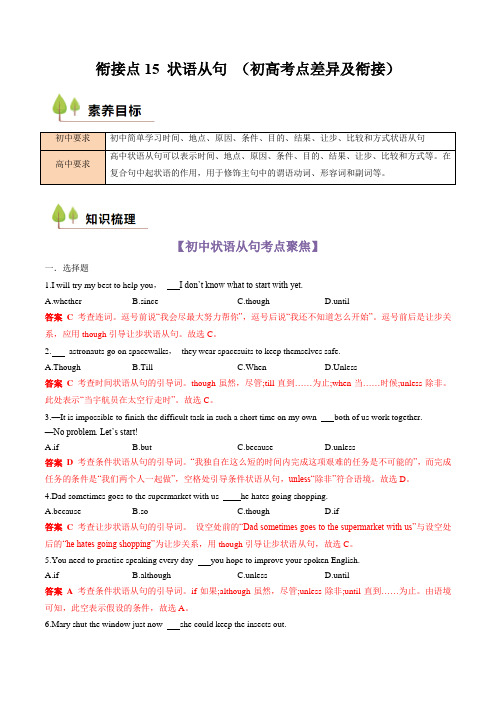
衔接点15 状语从句(初高考点差异及衔接)初中要求初中简单学习时间、地点、原因、条件、目的、结果、让步、比较和方式状语从句【初中状语从句考点聚焦】一.选择题1.I will try my best to help you,I don’t know what to start with yet.A.whetherB.sinceC.thoughD.until答案C考查连词。
逗号前说“我会尽最大努力帮你”,逗号后说“我还不知道怎么开始”。
逗号前后是让步关系,应用though引导让步状语从句。
故选C。
2. astronauts go on spacewalks,they wear spacesuits to keep themselves safe.A.ThoughB.TillC.WhenD.Unless答案C考查时间状语从句的引导词。
though虽然,尽管;till直到……为止;when当……时候;unless除非。
此处表示“当宇航员在太空行走时”。
故选C。
3.—It is impossible to finish the difficult task in such a short time on my own both of us work together.—No problem. Let’s start!A.ifB.butC.becauseD.unless答案D考查条件状语从句的引导词。
“我独自在这么短的时间内完成这项艰难的任务是不可能的”,而完成任务的条件是“我们两个人一起做”,空格处引导条件状语从句,unless“除非”符合语境。
故选D。
4.Dad sometimes goes to the supermarket with us he hates going shopping.A.becauseB.soC.thoughD.if答案C考查让步状语从句的引导词。
设空处前的“Dad sometimes goes to the supermarket with us”与设空处后的“he hates going shopping”为让步关系,用though引导让步状语从句,故选C。
- 1、下载文档前请自行甄别文档内容的完整性,平台不提供额外的编辑、内容补充、找答案等附加服务。
- 2、"仅部分预览"的文档,不可在线预览部分如存在完整性等问题,可反馈申请退款(可完整预览的文档不适用该条件!)。
- 3、如文档侵犯您的权益,请联系客服反馈,我们会尽快为您处理(人工客服工作时间:9:00-18:30)。
初高中衔接班配套练习--基本句型
一.复习巩固句子成分-Consider the past, and you shall know the future.
请在括号内写出该部分在句子当中的成分。
1.I(_______) met(________) my new beautiful(________________)English teacher(___________) on June. 12th(___________).
2.She(_______) left(_______) me(_______) a deep impression(_______) in the first English class(_____________).
3.She(_______) made(_______) us(_______) laugh(_______) because she was so humorous (_______)
4.My English(_______) will be(_______) better(_______) if I learn from her(_______).
5.I(_______) hope(_______) that she will always be my English teacher(_______)!
二.基本句型基础知识-A good beginning is half done.
(一)动词分类
1._______________________________________
2._______________________________________
3._______________________________________
(二)基本句型分类
1.
Example:
2.
Example:
3.
Example:
4.
Example:
5.
Example:
6.补充
三.相关练习-Practise makes perfect!
(一)请辨别下列句子为何种句型。
________1. We are having an English class now.
________2. We felt excited and happy.
________3. All of my classmates study hard.
________4. Students call their English teacher Round. ________5. Could you pass me the book?
(二)翻译以下句子并标明何种类型。
1.Tom已经离开了。
(________)
__________________________________________ 2.我应该把相机留给你。
(________)
__________________________________________ 3.时间飞逝。
(________)
__________________________________________
4.这些橘子很新鲜。
(________)
__________________________________________
5.这个讲座听起来很有意思。
(________)
__________________________________________
6.他的疾病让他身体很虚弱。
(________)
__________________________________________
7.教室里有54个学生。
(________)
__________________________________________
8.我有一本英语书。
(________)
__________________________________________
9.我发现大部分的老师和同学们都有友好。
(________)_______________________________ __________________________________________
(三)分析以下句子结构。
(Page6-第二大题)
1.The 100-year-old school lies in the centre of the city.
2.We muct act.
3.The maths homework looks easy.
4.The teacher found the classroom empty.
5.My mum bought me a new dictionary.
6.Tom is lookng forward to meeting the new exchange student.
7.There is an English Corner at our school.
8.We had chemistry in the newly built lab.。
